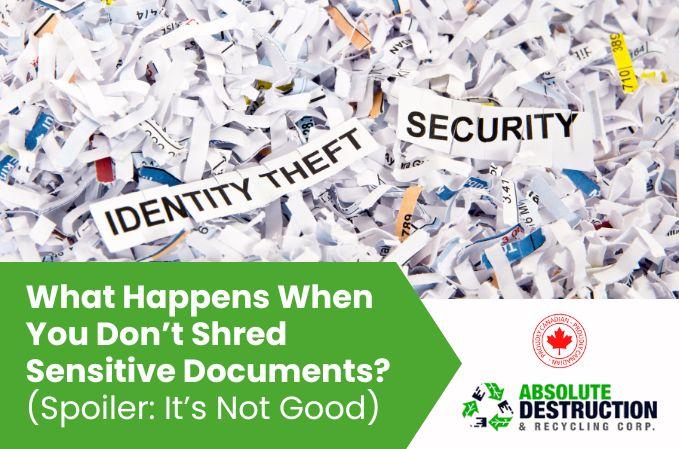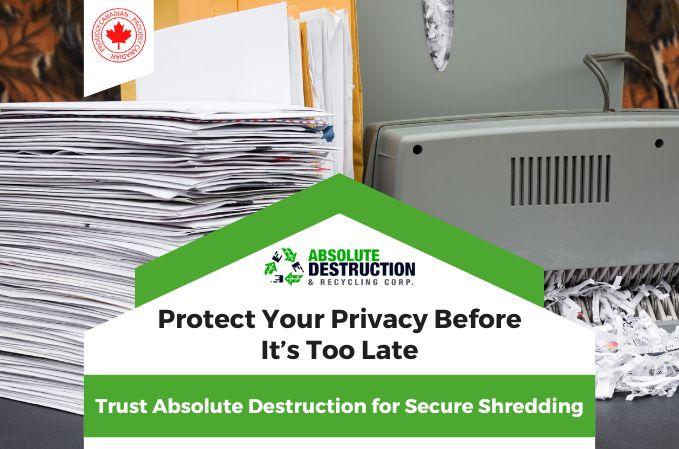Wednesday, April 9, 2025 3:00 pm, Posted by Absolute Destruction

You’ve got a filing cabinet stuffed with old documents. There are bank statements, contracts, medical records, tax forms and other once-important papers in there. They’re taking up space, and let’s be honest, you haven’t touched them in years. It’s time to declutter.
So, can’t you just pull those papers out of the filing cabinets, toss them into the recycling bin and call it a day? You can do that, but you shouldn’t.
Why not? Find out exactly what awful things could happen when you just toss your sensitive documents in the recycling instead of getting them professionally shredded first.
The Risks of Not Shredding Sensitive Documents
Leaving sensitive documents unsecured—whether at home or in the office—creates major security risks. Internal threats, such as disgruntled employees, and external threats, like dumpster divers, can easily access improperly discarded confidential information. Even tossing documents in your household trash or recycling isn’t safe—you never know who could root around in your bins.
What could happen if your documents get into the wrong hands?
Identity Theft
Identity thieves actively search for improperly discarded documents in hopes that they will have personal information on them. They will use this information to open fraudulent accounts, steal funds and damage credit scores.
Holding onto tax records for too long can increase the risk of identity theft, while disposing of them too soon may lead to problems with audits or financial disputes. Understanding the right time to shred tax documents is crucial for both security and compliance. Read this if you’re wondering which records should you keep or destroy right now.
What other types of documents do they look for? Bank statements! This is why it’s critical to shred old bank statements before it’s too late.
Data Breaches
If your business isn’t securely shredding customer records, financial statements, or employee information, you’re creating a security vulnerability. A data breach could lead to reputational damage, legal trouble, and massive financial losses.
Legal Consequences and Penalties
Businesses have a legal obligation to protect the privacy of clients, customers, and employees, and failing to do so can lead to severe penalties. Under Canada’s Personal Information Protection and Electronic Documents Act (PIPEDA), improper disposal of personal data can result in fines of up to $100,000 per incident. Industries like healthcare and finance face even stricter regulations, where mishandling sensitive records could lead to lawsuits, government penalties, and reputational damage.
Real-Life Consequences: When Document Disposal Went Wrong
An Ontario Health Clinic's Improper Disposal of Patient Records
In a case investigated by the Information and Privacy Commissioner of Ontario (IPC), a health clinic failed to securely dispose of records containing personal health information. Patient records were found discarded in an unsecured recycling bin, prompting the IPC to initiate an investigation into the clinic's practices.
Safeway's Improper Disposal of Pharmacy Records
In 2015, the grocery store chain Safeway was ordered to pay a penalty of nearly $10 million as part of a settlement with California prosecutors. The case involved allegations that Safeway unlawfully disposed of customer pharmacy records containing private medical information by placing them in dumpsters, violating California's Confidentiality of Medical Information Act.
Radiology Regional Center's Loss of Patient Records
In December 2015, the Radiology Regional Center in Fort Myers, Florida, experienced a breach when paper medical files of its patients flew out of a disposal truck. Records for up to 483,000 individuals were being transported, but it's unclear how many were lost. The incident led to a lawsuit claiming that the breach put patients at risk of identity theft and fraud. Find out why medical identity theft is no joke.
Morgan Stanley's Data Protection Failure
Improper data disposal doesn’t just happen with paper records! It happens with digital records, too.
In 2020, the Office of the Comptroller of the Currency (OCC) fined the company Morgan Stanley $60 million for failing to properly decommission computers and erase encrypted data in devices that were eventually sold. This data involved confidential client information.
These cases highlight the critical importance of proper document disposal and the severe consequences that can arise from negligence in handling sensitive information.
Why Choose Absolute Destruction for Your Secure Shredding Needs?
Protect Your Information
Don’t risk identity theft or data breaches. Our secure shredding services ensure that your confidential information stays confidential. For businesses and individuals looking for maximum protection, we also offer on-site shredding services for ultimate security, ensuring that your sensitive documents are destroyed immediately at your location, leaving no chance for data exposure.
Comprehensive Data Destruction Services
Beyond paper shredding, we also specialize in secure data destruction for electronic devices. We can safely dispose of old cell phones, computers and tablets that you don’t need anymore.
We can even get rid of old USBs and flash drives gathering dust in storage. Our data destruction services ensure that your electronic data is permanently erased, preventing potential cyber threats and unauthorized access.
Helping the Environment
Shredding is all about sustainability. Our eco-friendly shredding solutions ensure shredded documents are properly recycled, keeping paper waste out of landfills and reducing environmental impact. Recycling shredded paper also saves resources like water and trees!
So, if you care about going green, we have your back. You can protect your privacy and the environment at the same time.

A Behind-the-Scenes Look at Our Secure Shredding Process
You’ve gathered up all of your papers and booked our services. Now, what happens? To get a good idea about what to expect, here’s a brief explainer of how our process works:
Step 1: Secure Collection
We provide locked bins for businesses and scheduled pickup services to ensure confidential information security before shredding.
Step 2: Safe Transportation
Your documents are transported to our secure facility in GPS-tracked vehicles, preventing unauthorized access or loss. For extra security, our team can do the shredding on-site.
Step 3: Industrial-Strength Shredding
We use advanced cross-cut and micro-cut shredding technology, making it impossible to reconstruct documents.
Step 4: Eco-Friendly Recycling
Once shredded, your paper is responsibly processed into recycled materials, ensuring sustainability without compromising security.
The Missing Step Before Recycling: Secure Document Destruction
When it comes to sensitive documents, there’s one crucial step you have to follow before recycling: complete destruction. Tossing papers straight into the blue bin without shredding them first can lead to huge consequences, from identity theft to legal fines. As you can see, the simplest way to protect yourself is by using a professional shredding service.
At Absolute Destruction, we ensure your documents are completely destroyed before being responsibly recycled, so you can safeguard your information while staying eco-friendly. Don’t take chances with your security—let us handle your shredding needs today.

